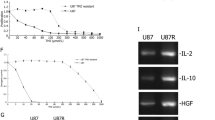Abstract
Purpose
Our aim was to investigate the relationship between mutant p53 and the prognosis of malignant glioma treated with temozolomide, and the regulation of mutant TP53 induced drug resistance, by molecular experimentation and a clinical trial.
Methods
Adult patients with newly surgical diagnosed glioblastoma were randomly assigned to receive either temozolomide or semustine after radiation treatment. The statuses of TP53 and expression of TP53 and O6-methylguanine DNA-methyltransferase (MGMT) were determined retrospectively in tumor tissue from enrolled patients. The primary end point was overall survival. Synthetic small interfering RNA was used to knock down mutant TP53 in T98G and U138 cells, which are human glioblastoma cells with a P53 mutation, by screening of exons 4–8. Viable cell survival was measured when these cells were exposed to temozolomide or semustine. Expression of MGMT at the messenger RNA level was also determined.
Results
The overall survival was 34.3 % at 2 years, 22.9 % at 3 years, 11.4 % at 4 years, and 8.6 % at 5 years with temozolomide, versus 18.2, 12.1, 3.0, and 0 %, respectively, with semustine. TP53 mutation and expression of mutant TP53 and MGMT showed significant inverse correlations with overall survival. Knockdown of mutant TP53 led to a fivefold increase in chemosensitivity to temozolomide but not semustine. Mutant TP53 knockdown induced down-regulation of MGMT expression.
Conclusions
Mutant TP53 is strongly associated with a poor prognosis for overall survival in patients with glioblastoma. Also, TP53 mutation may decrease the chemosensitivity of glioblastoma to temozolomide by increasing MGMT expression.



Similar content being viewed by others
References
Wu J, Zhang J, Zhuang D, et al. Current status of cerebral glioma surgery in China. Chin Med J. 2011;124:2569–77.
Stupp R, Hegi ME, Mason WP, et al. Effects of radiotherapy with concomitant and adjuvant temozolomide versus radiotherapy alone on survival in glioblastoma in a randomised phase III study: 5-year analysis of the EORTC-NCIC trial. Lancet Oncol. 2009;10:459–66.
Hegi ME, Diserens AC, Gorlia T, et al. MGMT gene silencing and benefit from temozolomide in glioblastoma. N Engl J Med. 2005;352:997–1003.
Rolhion C, Penault-Llorca F, Kemeny JL, et al. O(6)-methylguanine-DNA methyltransferase gene (MGMT) expression in human glioblastomas in relation to patient characteristics and p53 accumulation. Int J Cancer. 1999;84:416–20.
Blough MD, Zlatescu MC, Cairncross JG. 6O-methylguanine-DNA methyltransferase regulation by p53 in astrocytic cells. Cancer Res. 2007;67:580–4.
Bocangel D, Sengupta S, Mitra S, et al. p53-Mediated down-regulation of the human DNA repair gene O 6-methylguanine-DNA methyltransferase (MGMT) via interaction with Sp1 transcription factor. Anticancer Res. 2009;29:3741–50.
Louis DN, von Deimling A, Chung RY, et al. Comparative study of p53 gene and protein alterations in human astrocytic tumors. J Neuropathol Exp Neurol. 1993;52:31–8.
Deppert W. Mutant TP53 from guardian to fallen angel? Oncogene. 2007;26:2142–4.
Bossi G, Lapi E, Strano S, et al. Mutant TP53 gain of function: reduction of tumor malignancy of human cancer cell lines through abrogation of mutant TP53 expression. Oncogene. 2006;25:304–9.
Tsang WP, Ho FY, Fung KP, et al. TP53-175H mutant gains new function in regulation of doxorubicin-induced apoptosis. Int J Cancer. 2005;114:331–6.
Halevy O, Michalovitz D, Oren M. Different tumor-derived TP53 mutant exhibit distinct biological activities. Science. 1990;250:113–6.
Selivanova G, Wiman KG. Reactivation of mutant TP53: molecular mechanisms and therapeutic potential. Oncogene. 2007;26:2243–54.
Anker L, Ohgaki H, Ludeke BI, et al. p53 protein accumulation and gene mutations in human glioma cell lines. Int J Cancer. 1993;55:982–7.
Newcomb EW, Madonia WJ, Pisharody S, et al. A correlative study of p53 protein alteration and p53 gene mutation in glioblastoma multiforme. Brain Pathol. 1993;3:229–35.
Koga H, Zhang S, Kumanishi T, et al. Analysis of p53 gene mutations in low-and high-grade astrocytomas by polymerase chain reaction-assisted single-strand conformation polymorphism and immunohistochemistry. Acta Neuropathol. 1994;87:225–32.
Pardo FS, Hsu DW, Zeheb R, et al. Mutant, wild type, or overall p53 expression: freedom from clinical progression in tumours of astrocytic lineage. Br J Cancer. 2004;91:1678–86.
Petitjean A, Achatz MIW, Borresen-Dale AL, et al. TP53 mutations in human cancers: functional selection and impact on cancer prognosis and outcomes. Oncogene. 2007;26:2157–65.
Watanabe T, Katayama Y, Komine C, et al. O 6-methylguanine-DNA methyltransferase methylation and TP53 mutation in malignant astrocytomas and their relationships with clinical course. Int J Cancer. 2005;113:581–7.
Olivier M, Langerod A, Carrieri P, et al. The clinical value of somatic TP53 gene mutations in 1,794 patients with breast cancer. Clin Cancer Res. 2006;12:1157–67.
Petitjean A, Mathe E, Kato S, et al. Impact of mutant TP53 functional properties on TP53 mutation patterns and tumor phenotype: lessons from recent developments in the IARC TP53 database. Hum Mutat. 2007;28:622–9.
Powell B, Soong R, Iacopetta B, et al. Prognostic significance of mutations to different structural and functional regions of the p53 gene in breast cancer. Clin Cancer Res. 2000;6:443–51.
Peraud A, Kreth FW, Wiestler OD, et al. Prognostic impact of TP53 mutations and P53 protein overexpression in supratentorial WHO grade II astrocytomas and oligoastrocytomas. Clin Cancer Res. 2002;8:1117–24.
Groenendijk FH, Taal W, Dubbink HJ, et al. MGMT promoter hypermethylation is a frequent, early, and consistent event in astrocytoma progression, and not correlated with TP53 mutation. J Neurooncol. 2011;101:405–17.
Acknowledgments
Schering Plough provided temozolomide to all enrolled patients free of charge. This work was supported in part by the National Natural Science Foundation of China (30873007).
Disclosure
The authors report no conflict of interest concerning the materials or methods used in this study or the findings specified in this article.
Author information
Authors and Affiliations
Corresponding author
Rights and permissions
About this article
Cite this article
Wang, X., Chen, Jx., Liu, Jp. et al. Gain of Function of Mutant TP53 in Glioblastoma: Prognosis and Response to Temozolomide. Ann Surg Oncol 21, 1337–1344 (2014). https://doi.org/10.1245/s10434-013-3380-0
Received:
Published:
Issue Date:
DOI: https://doi.org/10.1245/s10434-013-3380-0




